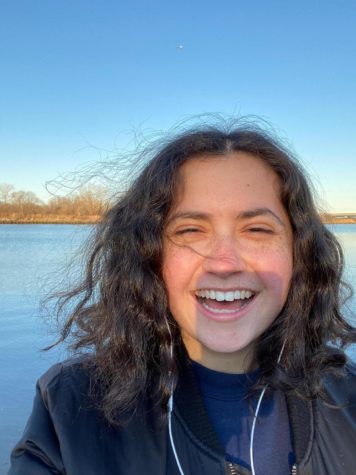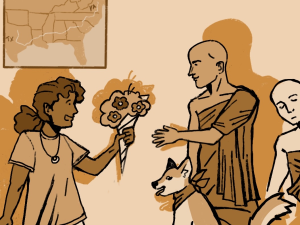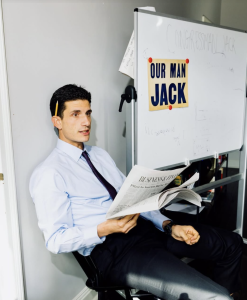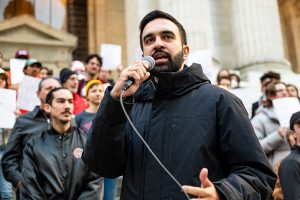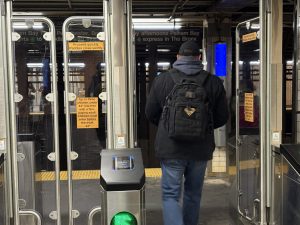President Wu reflects on his start at Baruch

Courtesy of Baruch College
December 10, 2020
Baruch College President S. David Wu took office on July 1 and was able to leave a positive impression on students, staff and faculty with his efforts in this short time frame.
Back in October, The Ticker sat down with Wu for a one-on-one interview about the beginning of his term. While this interview could not be published at the time because of technical issues, it still remains relevant.
During this interview, Wu, who came in to replace 10-year Baruch President Mitchel Wallerstein after his retirement this summer, reflected on the start of his time at Baruch and discussed some of his goals for the future.
Wu was confirmed as the college president at theCUNY Board of Trustees meeting on Feb. 3 withs unanimous votes, making him the first Asian American Baruch president.
Before joining the CUNY family, Wu was George Mason University’s provost and executive vice president.
“It is a privilege to join this remarkable community and I am both honored and humbled,” Wu was quoted as saying in a CUNY press release after his confirmation. “Baruch is one of the most impressive institutions I have encountered in my academic career. The combination of achieving academic excellence at the highest level, while being the most effective agent for social mobility not only makes Baruch a prime example for the founding vision for the CUNY system, but makes Baruch a model for public higher education.”
During April and May, prior to his taking office, Wu began preparing for his term, primarily by creating what he calls the Task Force for the Future, a group of 20 senior staff, faculty and administrators. The Task Force for the Future was established to help Wu develop a plan for the school during the coronavirus pandemic.
“I gave them two main charges, and one is to engage the whole college community and to get it ready for the fall semester and, also, the whole academic year, really, in this new environment,” Wu told The Ticker. “Because there are a million things that we have to get ready and be able to serve the students . . . so, that’s the first charge for the task force.”
He explained that the second duty he assigned the task force was to analyze the possible long-term impacts of the pandemic on students and staff. For this charge, the task force was able to create a report that provided Wu with information on what kinds of support the college would need to provide its community.
“I’m very grateful for the work that they have done to get us ready,” Wu said. “We are probably one of the institutions — both within the [CUNY] system and around the country — being able to do that.”
This semester, Baruch experienced an over 5% enrollment increase, which Wu believes is a result of the college’s preparedness and organization.
While the college administration had done work to prepare for another online semester — and now, as it was announced on Oct. 28, an entire online year — there were some roadblocks that it encountered, Wu explained.
For example, there was the issue of international students who were staying in the United States on student visas.
“At one point, there was this policy from the Department of Homeland Security that’s going to impose some visa restrictions for international students, because technically they are not allowed to take more than one online class to keep their visa,” Wu said. “So, some of their visas would be in jeopardy, so we actually quickly came up with a plan in response to that and also there were a lot of national movements for that.”
That DHS policy Wu mentioned was announced in July and was withdrawn after large backlash.
Wu also touched on the issue of Proctortrack, the online proctoring software that CUNY had been considering to use for the remote school year.
Students and some professors opposed the idea of making students download proctoring software onto their personal computers, as many felt it was an invasion of privacy. Before Proctortrack, CUNY was considering a system called Proctorio, but later switched to Proctortrack because it was deemed less invasive.
While the university’s plans to use the software are now defunct, after the company faced a cyber attack affecting other schools’ data, at the time of the interview, it looked like Proctortrack was going to be the new reality for students.
Wu explained, at that point, no contract between CUNY and Proctortrack had been signed yet and that if the university did decide on Proctortrack, it would become the default for each college, meaning that colleges would still have the power to decide whether to use it or not.
Each college was going to have the ability to internally decide on it and departments were going to be able to choose alternatives as well. Additionally, students were going to be notified in the syllabus for each class about whether Proctortrack was going to be required for the course or not.
“You certainly want to make sure that your effort is being affirmed by the academic integrity of the whole class, you know?” Wu said in an explanation of why a proctoring service was being considered in the first place. “You don’t want, you know, all your peers are cheating and then you are the one who only sleeps for three hours and studies for the exam. So, I think that tradeoff is really critical to maintain, because, obviously, it’s to all of our best interests, and certainly to the students’ best interests, that academic integrity is maintained.”
Since proctoring services from any company will now not be used within CUNY, the colleges are looking at other ways to protect academic integrity during distance learning exams, including making exams in-person.
The “communications president,” as Wu has been called by members of the college staff, also discussed a topic he wrote about in his second blog post for students.
He said that during his time at Baruch, for however long that will be, he wants to “systemize student first culture.”
“What I meant by that is, we do have a student first culture at a college, but how do we manifest it into systems and structures that you experience?” Wu said. “I think [it’s] a way to make your experience a lot more smooth and seamless and also sort of customized to your needs.”
The president also mentioned all of the recognition that Baruch has received in the past months, such as from The Wall Street Journal back in the beginning of the semester.
“I have been absolutely thrilled with the experience, and the reason that I’m thrilled is everyday I’m meeting new people and people who are associated with Baruch or people who are supporting Baruch or stakeholders for Baruch, and I have been absolutely impressed and inspired by the people I met,” Wu said. “And people who work here are not only passionate and committed but absolutely top-notch and talented, and many of them are really top talent in their fields and they want to work here because they believe in the mission of the institution.”


